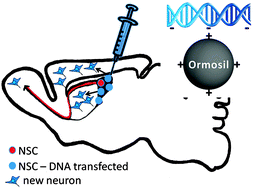Targeting novel integrative nuclear FGFR1 signaling by nanoparticle-mediated gene transfer stimulates neurogenesis in the adult brain†
Abstract

* Corresponding authors
a Molecular and Structural Neurobiology and Gene Therapy Program, Department of Pathology and Anatomical Sciences, State University of New York, Buffalo, USA
b
Institute for Lasers, Photonics and Biophotonics, Department of Chemistry, State University of New York, Buffalo, USA
E-mail:
mks4@buffalo.edu
Tel: (716) 829 3540
c Department of Comparative Morphology and Biochemistry, University of Camerino, Camerino (MC), Italy
d CH3 BioSystems LLC New York State Center of Excellence in Bioinformatics and Life Sciences, Buffalo, USA

 Please wait while we load your content...
Something went wrong. Try again?
Please wait while we load your content...
Something went wrong. Try again?
 Fetching data from CrossRef.
Fetching data from CrossRef.
This may take some time to load.
Loading related content
